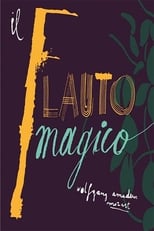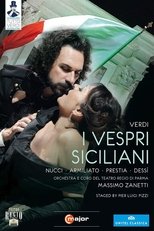

Adriana Di Paola
Movies for Adriana Di Paola...

Title: The Magic Flute
Released: January 8, 2021
Type: Movie
A handsome prince falls in love with an abducted princess. Armed with musical instruments, he and his singing sidekick mount a rescue mission that tests their commitment to truth, love and humanity itself. Staging a mass revolt against the powers that be, British director Graham Vick has enlisted a good hundred locals and immigrants as demonstrators occupying makeshift camps on the flanks of Sferisterio's impressive open air stage. Sung in simple, modern Italian, Mozart's famous Singspiel takes on a liveliness and spunk that stresses the opera's folk roots and conveys the sense that the action is unfolding around us today.


Title: StraussR: Ariadne auf Naxos
Character: Dryade
Released: January 1, 2013
Type: Movie
Glyndebourne's wartime history as a home for evacuee children is the ingenious context for a new production of this unclassifiable entertainment in which low comedy and high tragedy compete for our attention, "borne aloft by Strauss's divine music and Hofmannsthal's visionary poetry". At the centre of this production from Katharina Thoma is the noble, tragic figure of the abandoned Ariadne herself, in a haunting performance from Soile Isokoski, 'with brilliant support from the pit' (The Independent).


Title: I vespri siciliani
Character: Ninetta
Released: October 20, 2010
Type: Movie
Part of Tutto Verdi series 'I vespri siciliani' ('The Sicilian Vespers') is a five-act Italian opera originally written in French for the Paris Opéra and translated into Italian shortly after its premiere in June 1855. Under its original title, 'Les vêpres siciliennes', the libretto was prepared by Eugène Scribe and Charles Duveyrier from their work 'Le duc d'Albe', which was written in 1838 and offered to Halévy and Donizetti before Verdi agreed to set it to music in 1854. The story is loosely based on a historical event, the Sicilian Vespers of 1282, using material drawn from the medieval Sicilian tract 'Lu rebellamentu di Sichilia'.
